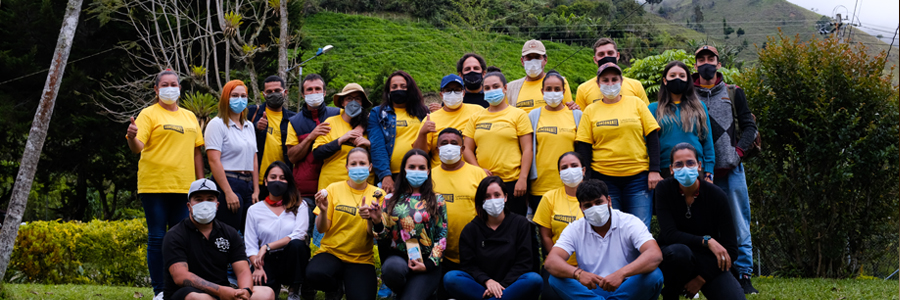Colombia: Strengthening the Oversight Role of Social Leaders and Media Actors
As part of DCAF's contributions to civil society and media oversight of the security sector, we are currently leading a programme in Colombia with the support of the German Ministry of Foreign Affairs and the German Embassy in Bogota. This initiative focuses on strengthening the role of journalists and social leaders in security sector oversight in Colombia and fostering a better working relationship between media practitioners and the Colombian National Police.
By working closely together with the Colombian National Police and the partner organizations Foundation for Press Freedom (FLIP) and the Digital School (La Escuela Digital), the programme aims to achieve the three below outcomes.
Outcomes/Workstreams
 Although both media practitioners and security sector actors play an essential role for the public interest, disagreements can often arise in the course of their duties that, instead of being constructive, are marred by hostility, mistrust, sensationalism, or violations of the right to freedom of press or other human rights.
Although both media practitioners and security sector actors play an essential role for the public interest, disagreements can often arise in the course of their duties that, instead of being constructive, are marred by hostility, mistrust, sensationalism, or violations of the right to freedom of press or other human rights.
In Colombia, many of these tensions occur in the context of massive social protests, such as those that took place in November 2019 or April 2021. Other conflicting scenarios may include public elections, crime scene documentation or evictions. Faced with these challenges, it remains essential to promote a constructive working relationship between media workers and members of the National Police, that is based on a mutual understanding of each other’s rights and duties, good governance principles and human rights standards.
It’s against this backdrop that DCAF, the Colombian National Police and the Foundation for Press Freedom (FLIP) are working together on improving the relationship between the Colombian police and media practitioners through the following interrelated activities:
- Making online courses available to members of the police and journalists to foster a better understanding of each other’s roles, rights and duties
- Organizing focus groups between members of the police and journalists in all regions of Colombia to encourage open discussions about each other’s concerns and proposing agreements for a better working relationship
- Developing guidelines for mutual understanding between members of the National Police and journalists, based on the agreements reached during the focus groups discussions and with follow-up mechanisms
Photo: Gabriel Linares, FLIP
 According to a mapping exercise carried out by the Freedom of Press Foundation (FLIP), more than half of Colombian Municipalities can be catalogued as ‘silent zones’, which are places where local media coverage is scarce, if at all existing. The result is that approximately 10 million of inhabitant in Colombia, mostly living in rural areas, lack access to reliable and well-sourced information about what is happening around them. In relation to Security Sector Governance, access to credible information is especially important in a conflict-affected country like Colombia, where the public lives with memories of past abuse and continues to face security threats due to the strong presence of illegal armed groups and illicit economies affecting their livelihoods.
According to a mapping exercise carried out by the Freedom of Press Foundation (FLIP), more than half of Colombian Municipalities can be catalogued as ‘silent zones’, which are places where local media coverage is scarce, if at all existing. The result is that approximately 10 million of inhabitant in Colombia, mostly living in rural areas, lack access to reliable and well-sourced information about what is happening around them. In relation to Security Sector Governance, access to credible information is especially important in a conflict-affected country like Colombia, where the public lives with memories of past abuse and continues to face security threats due to the strong presence of illegal armed groups and illicit economies affecting their livelihoods.
Against that backdrop, the programme sponsors a 2-month training course led by FLIP on local journalism for social and community leaders living in ‘silent zones’, who are interested in producing local information that is relevant to the struggles of the communities in which they live. The program covers 7 municipalities where approximately 210 social leaders are being trained.
After completing the training, participants have the possibility to publish their own articles and news on the Consonante website, a new digital media in Colombia where local information can be disseminated in a simple format to facilitate the outreach in rural areas. The news produced for Consonante can be accessed here.
Photo: FLIP
 Nowadays, human rights advocacy and oversight of the security sector from the civil society cannot overlook the potential of the digital sphere. The Digital School (La Escuela Digital), an organization that offers training in social media content creation, has worked in the past with recognized social leaders in Colombia and has found that many of them are interested in venturing into social media but often lack the technical knowledge, time, support, or resources to do so.
Nowadays, human rights advocacy and oversight of the security sector from the civil society cannot overlook the potential of the digital sphere. The Digital School (La Escuela Digital), an organization that offers training in social media content creation, has worked in the past with recognized social leaders in Colombia and has found that many of them are interested in venturing into social media but often lack the technical knowledge, time, support, or resources to do so.
Given this interest, in partnership with The Digital School, the program offers trainings on social media to 10 recognized social leaders and human rights defenders in Colombia, who come from different backgrounds and promote a variety of causes. A professional team accompanies the trainees in the process of producing scripts and videos and provides them with a solid foundation for publishing their own content independently. Ultimately, the learned skills shall serve them as a platform to gain greater visibility for their activism, raise awareness about risks, combat stigmas and misrepresentations and exercise oversight of the actions of public authorities, including security sector actors.
Photo: Diego Rodriguez, La Escuela Digital
PUBLICATIONS
Contacts
Enric Gonyalons, Project Coordinator, Latin America & the Caribbean Unit (e.gonyalons@dcaf.ch)
